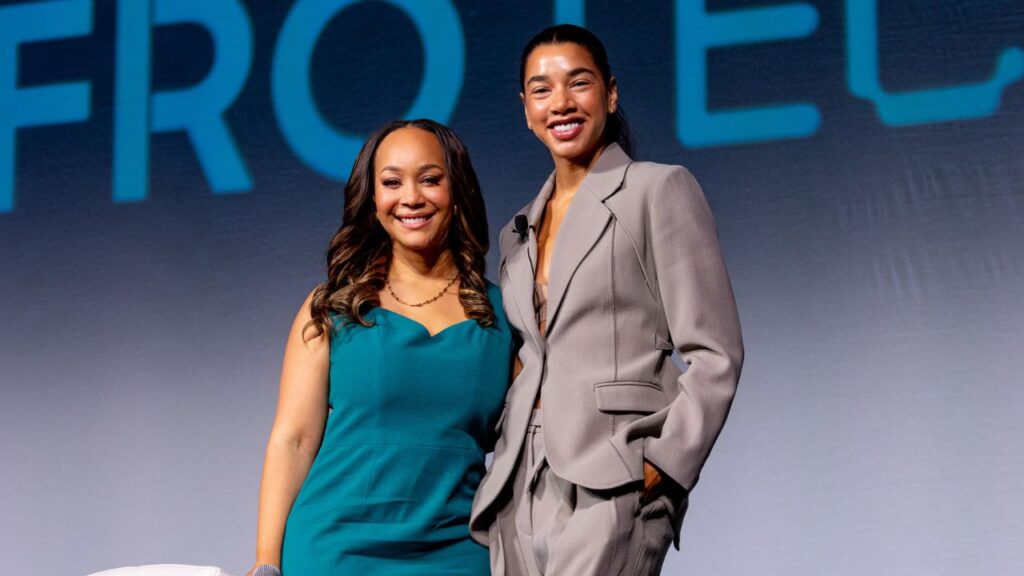Hannah Bronfman got super candid with Blavity’s founder and CEO of Morgan DeBaun about the importance of being a money magnet for startup companies that are often overlooked, especially when they cater to women during day one at AfroTech.
Bronfman is a content creator, former DJ and powerhouse in advising and raising venture capital for businesses.

With over 1 million social media followers, she has built a career that’s allowed her to generate millions of dollars for over 70 companies in the beauty, wellness and healthcare industries. Some of those companies include Topicals, Golde and Monte’s Fine Foods.

View this post on Instagram
During their discussion, Bronfman shared that her pathway to becoming a trusted angel investor began when she co-founded an innovative beauty app that provided that allowed women to book last-minute appointments with select salons and spas in certain cities. When her partner decided to leave the business, she was enlightened in investing as she leaned into her network to raise funds. Simultaneously, she built her social media presence.
In 2015, she corresponded with companies about their marketing initiatives ahead of the influencer marketing wave, which led to her organically guiding companies on how to be more strategic online. Two years later, she decided to become an investor.
“I started to actually write checks in 2017 and then, you know, as I kind of became a larger creator, I also was gifted equity in companies in exchange for, you know, doing kind of the marketing efforts that they were looking for,” she told DeBaun. “So, it was kind of like a perfect storm of things. And since 2017, you’ve invested in over 70 companies.”
Her goal as an investor is to prioritize minority-owned businesses, particularly focused on those led by Black women, as they often face greater challenges in securing investment compared to their counterparts. She spoke about the significance of being knowledgeable about the industries people choose to give their money to.
“I think for anyone, they have to feel comfortable in the sector that they are investing in,” she said. “If you know nothing about Bitcoin, I wouldn’t suggest investing in that sector. Or if you know nothing about AI, I wouldn’t suggest investing unless you are going to get educated around that industry.”
This prompted Bronfman to highlight the importance of people utilizing their network and being transparent about their needs because investors are always nearby.
“It’s also really important to sort having these conversations with your community because I think that actually more people around you than you think are also investors and not bringing, and some people don’t bring you opportunities and so you have to find ’em,” she shared. “And you must start having these conversations with people because that’s how you get intros, that’s how you build your network. That’s how you get on cap tables.”
She gave the audience an example of being resourceful when she divulged that she used her job as a DJ to cultivate partnerships for her clients.
“Every DJ gig was a door into a marketing department. So were there opportunities for me to say to a company, ‘Hey, I think your consumer would also love this product Golde. Can we have them, you know, do the lattes at your next breakfast event,'” Bronfman said. “So I think those leaning into your angel investors is really important because if you’re at a stage where you don’t have institutional backing on your cap table yet, you really need those people to help you build your business.”
For the last several years she has been transitioning her investments into more institutionalized structures or portfolios. The first company she did this for was Kind Body in 2017, which is now worth $1.8 billion. Her next goal is to start a fund of her own to expand on the work she’s already done.
“If we don’t see these acquisitions happen, how do we know that we’re gonna be able to build what we need to build in order to create generational wealth? And so I was like, okay, the issue here really is that we don’t have any holding companies for the culture. And that’s as simple as that. Where is our black LVNH? And I was like, okay, I’m gonna do that,” Bronfman explained after discussing the response from the Black community regarding Procter & Gamble’s acquisition of Mielle Organics.
“I was like, that is way harder than I think I am skilled to do, but what am I really good at? I’m really good at venture. And so I have taken the immense responsibility of moving myself into the world of institutional VC and starting my own firm. And you know, maybe eventually one day I’ll get to that holding [company] position,” she added.
